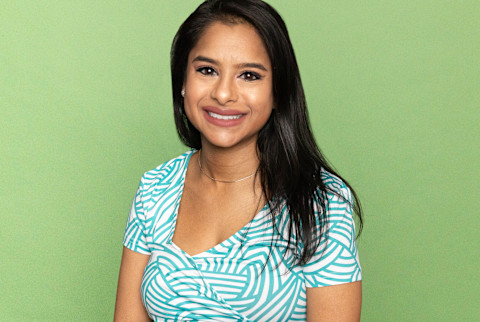Top 3 Ways To Eat For Optimal Gut Health, According To Bindiya Gandhi, MD

When it comes to working with her patients, Bindiya Gandhi, M.D., has the goal of getting to the root cause of certain issues and making patients feel healthy in the most natural way possible. As a family medicine physician with a passion for functional medicine, Gandhi couples her traditional education and training with a nutritional medicine lens, making her a unique, cutting-edge professional in the medical field.
Gandhi offers some great tips and advice (you'll seriously want to listen to this episode of the podcast with a notebook and pen in hand) on a variety of topics we can approach with a "food is medicine" mentality, ranging from balancing hormones to taming inflammation to fertility. But one specific topic she covers during our chat is how she advises her patients to optimize their gut health.
Gut health should be a priority, Gandhi states, because of its ability to affect so many other processes in our bodies. When our gut health becomes compromised, it can lead to chronic issues like IBS, SIBO, and Crohn's disease and can even have an effect on our brain health. "The gut is so important. You want to diversify it and keep it healthy," she says.
To keep our guts healthy, here are Dr. B's three easy ways we can change our diets. Whether you suffer from chronic GI pain such as IBS or Crohn's, or if you're just experiencing some unwanted bloat, you'll want to check out these steps on how to get your gut back in order:
1. Probiotics are key.
Probiotics are essential for gut health, as consuming these microorganisms maintains harmony in the body and offers a variety of health benefits, including but not limited to improving the immune system, helping you maintain a healthy weight, and improving bloating conditions.
We know that probiotics are significant for optimizing our health, but how can we incorporate these guys into our diets and get them into our guts? Gandhi assures me that it's actually quite simple to add probiotic-rich foods into our diets. She routinely cooks with and consumes these foods herself and even prescribes some of these foods to her patients.
"There are ways you can get probiotics in your food, like kombucha, sauerkraut, kimchi, miso. I usually encourage dairy-free kefir for people who are dairy-sensitive," she says. Even if you can't stomach a container of Greek yogurt, there are still many other ways to get your probiotics in.
2. And fiber is crucial.
"Fiber is super important," Gandhi notes. "Personally I do a lot of fiber like psyllium husk in my cooking. Onions, chicory root, those kinds of things are all good prebiotic-rich foods that you want to incorporate into your meals."
Prebiotics are a type of fiber, which will pave the way for good bacteria to enter the gut. Think of consuming prebiotics as a sort of fertilizer for bacteria—it stimulates this bacterial growth and contributes to benefits such as balancing blood sugar and encouraging bowel movements. It also keeps you fuller for longer, which is always a great benefit for a healthy meal.
"We as a society do not eat enough fiber," Gandhi adds. Agreed, Dr. B.
3. Don't be afraid to supplement (both probiotics and prebiotics).
While probiotics and prebiotics can be found in our diets, sometimes people need a little extra help to get an adequate amount of these healthy nutrients. Gandhi is a huge supporter of supplements, and she believes that they're super helpful to optimize gut health.
"I think everybody should be on a probiotic all the time," she mentions.
In the vast land that is the CVS supplement aisle, sometimes it can become confusing (or scary) to know where to start in terms of vitamins. While it's always best to consult your primary care physician with these questions, Gandhi tells me that she recommends specific probiotic and prebiotic supplements to a lot of her patients.
"Glutamine is one of my favorite supplements," she says. "And inulin is another supplement that you can use." Glutamine supplements can nourish the gut, according to Gandhi, while inulin (most often extracted from chicory root) is a great source of dietary fiber to add to your diet.
In case the concept isn't burned into your brain already, our gut is the foundation for so many other aspects of our overall health. That being said, it's so important to take care of our gut microbiome and use our diets to fuel it with healthy, necessary bacteria.
"If you have an imbalance of good bacteria," Gandhi says. "That's going to link to heart disease later on in life, or Alzheimer's, or other medical conditions, or autoimmune conditions. So to me, gut health is so important. All medical problems start in the gut."
And while the gut is responsible for so many complicated processes in our bodies, keeping it healthy can actually be quite simple—all it takes is a nutrient-dense diet. Food really is medicine; take it from Dr. B, herself.
